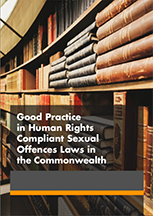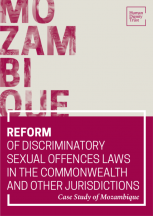As part of our legislative reform work, the Human Dignity Trust has continued its examination of colonial-era sexual offences legislation within the Commonwealth and the extent to which these laws discriminate against women and girls, LGBT people, people living with disability, and others. As a culmination of this work, the Trust has recently released its flagship report, Good Practice in Human Rights Compliant Sexual Offences Laws in the Commonwealth.
This first of its kind report develops a list of key indicators of good practice on the basis of established international human rights standards, against which domestic sexual offences laws can be assessed, and reforms can be guided. The report identifies a range of examples of good practice from all five regions of the Commonwealth and evaluates the extent to which each criterion is met by the specific laws of the country in question.
There are a range of good practices in use across all regions of the Commonwealth
The research was launched by the Human Dignity Trust in the wings of the recent Commonwealth Law Ministers’ Meeting in Sri  Lanka to an audience including Ministers of Justice, Attorneys General, High Commissioners and other senior legal officials. Making the case for reform was Seychelles Attorney General Frank Ally, who chaired the event and spoke to his country’s experience of reforming their sexual offences legislation. The South African delegation, led by Minister of Justice Ronald Lamola, spoke to the importance of putting into practice reformed laws.
Lanka to an audience including Ministers of Justice, Attorneys General, High Commissioners and other senior legal officials. Making the case for reform was Seychelles Attorney General Frank Ally, who chaired the event and spoke to his country’s experience of reforming their sexual offences legislation. The South African delegation, led by Minister of Justice Ronald Lamola, spoke to the importance of putting into practice reformed laws.
The report itself considers four areas of sexual offences legislation and establishes a set of criteria within each area. These are rape/sexual assault laws; sexual offences provisions relating to people living with disability; age of consent laws; and laws governing consensual same-sex sexual activity. Within the criteria established, the report challenges pervasive myths and misconceptions all too common across the Commonwealth, such as:
- husbands cannot rape their wives;
- women lie about rape;
- people living with disability cannot consent to sex;
- men and boys cannot be the victims of rape/sexual assault; and
- lesbian and bisexual women can be ‘cured’ by having forced sex with men.
Building on this ground-breaking work, the Trust has published a major research project mapping the current status of sexual offences laws in all Commonwealth jurisdictions, assessing their compliance with criteria derived from the Good Practice report. The research, Next Steps Towards Reform: Assessing Good Practice And Gaps In Commonwealth Sexual Offences Legislation consists of checklists in a series of five regional reports, using a traffic light system in place to assess the degree to which the law complies with the good practice criteria.
The Trust’s work on sexual offences reform has been ongoing since 2015 when the need for a broad, intersectional approach to the reform of sexual offences laws throughout the Commonwealth, left behind as a legacy of British colonial rule, became clear. The Trust, with support from Global Affairs Canada, has produced a number of case studies which spotlight real world examples of successful efforts to modernise colonial-era penal codes, including reforms to laws which criminalise same-sex sexual activity, fail to properly protect women and children, and disparage and denigrate people living with disability.
 The Trust has so far published five case studies highlighting reforms in Belize, Seychelles, Nauru, Northern Cyprus, Palau, and Mozambique. Together, the reports identify three common drivers of reform essential to these successes: an internal political will and the commitment of domestic political champions; the persistence and determination of civil society actors; and the collaboration and interaction with the international community, including NGOs and intergovernmental bodies such as the UN.
The Trust has so far published five case studies highlighting reforms in Belize, Seychelles, Nauru, Northern Cyprus, Palau, and Mozambique. Together, the reports identify three common drivers of reform essential to these successes: an internal political will and the commitment of domestic political champions; the persistence and determination of civil society actors; and the collaboration and interaction with the international community, including NGOs and intergovernmental bodies such as the UN.
These case studies identify three proven models of change in relation to reform of sexual offences legislation which can inspire similar future reforms. These models are: wholesale reform of criminal/penal codes not limited to sexual offences laws; broad sexual offences reform across a range of areas of law; and targeted sexual offences reform to address a specific provision, such as the criminalisation of same-sex sexual activity.
Together, the Good Practice report, mapping of sexual offences laws, and case studies of successful reforms combine to form a rich body of research comprising:
- the standards that sexual offences legislation must meet in order to comply with international human rights law
- the current state of play of the laws of every Commonwealth jurisdiction and the extent to which these standards are being met
- recent examples of successful reforms, including the drivers of reform and models of change.
This resource base is already informing and shaping the Trust’s technical assistance work and will continue to feed into and guide future reform efforts.
To view and download all of the published reports referenced here and a range of other materials, and to keep up to date with all future publications, visit the Human Dignity Trust’s resources page.

